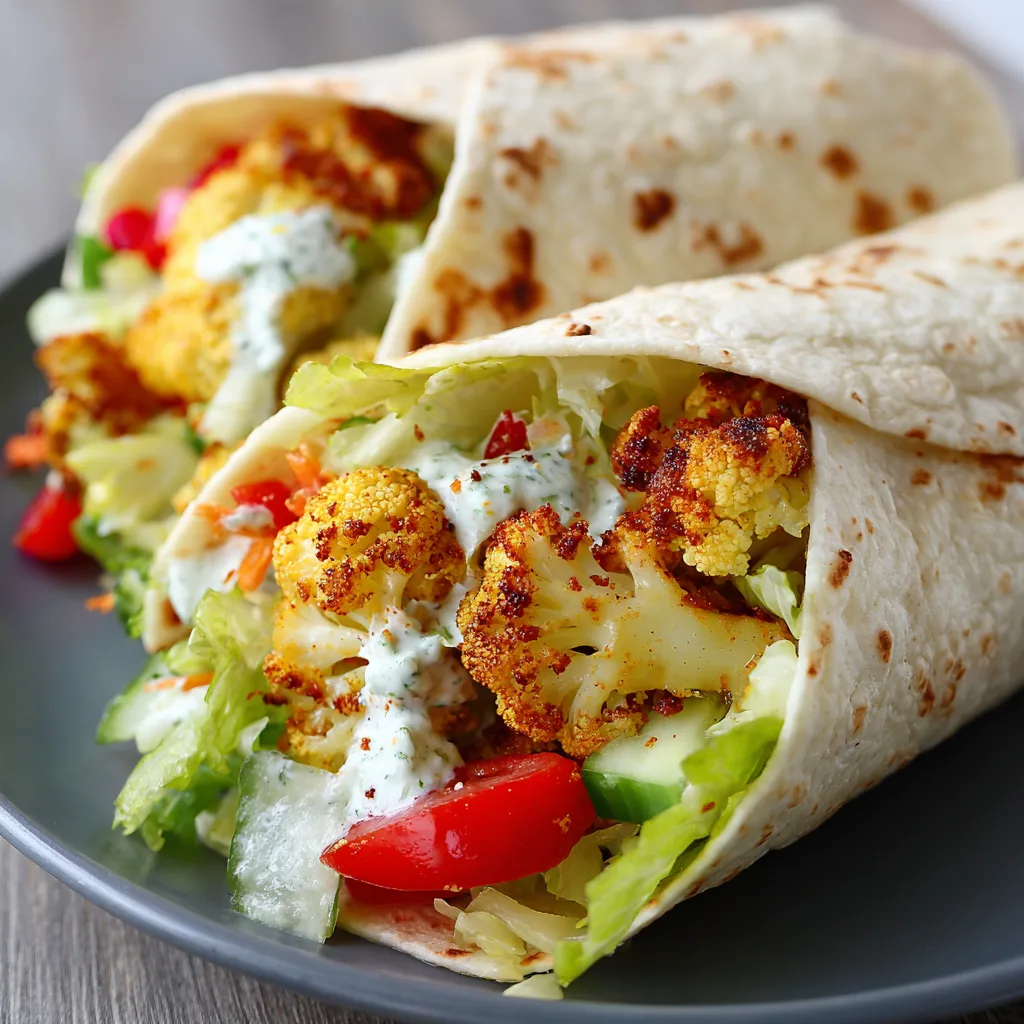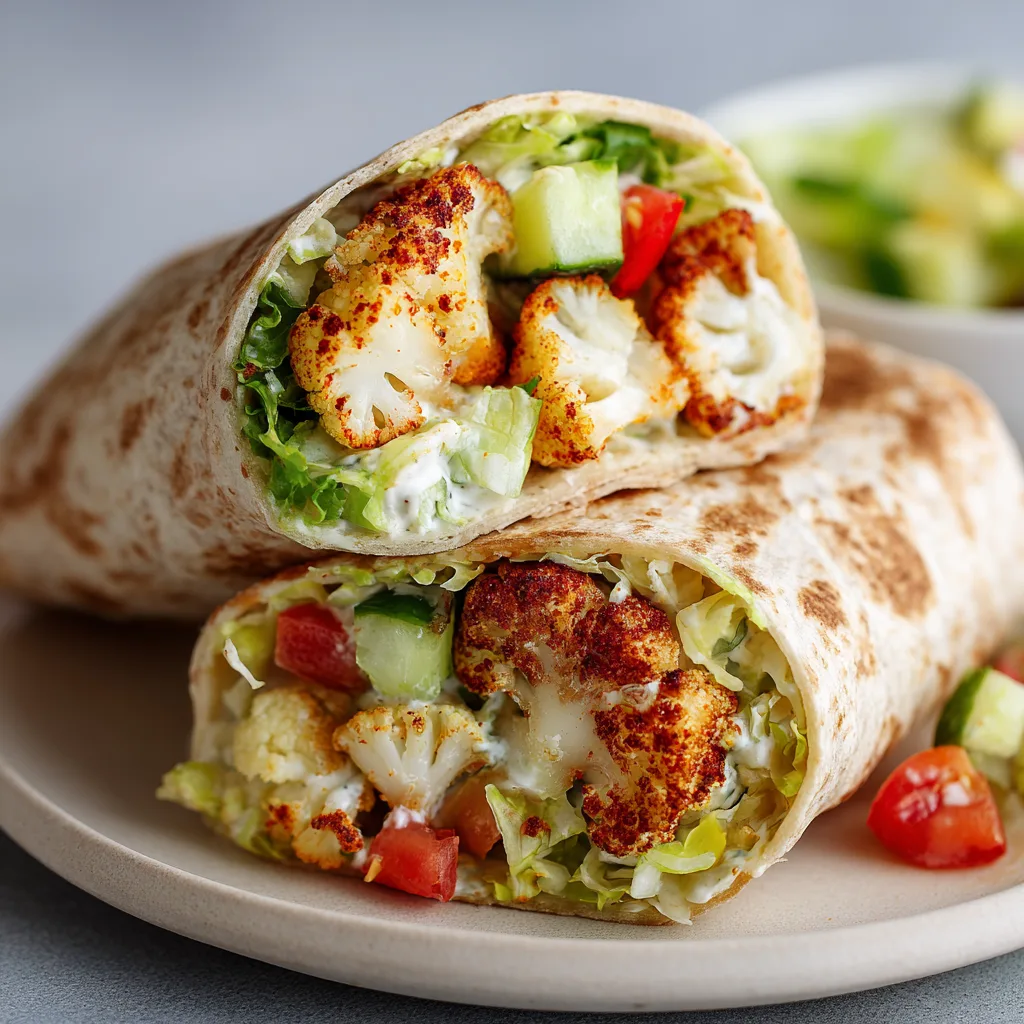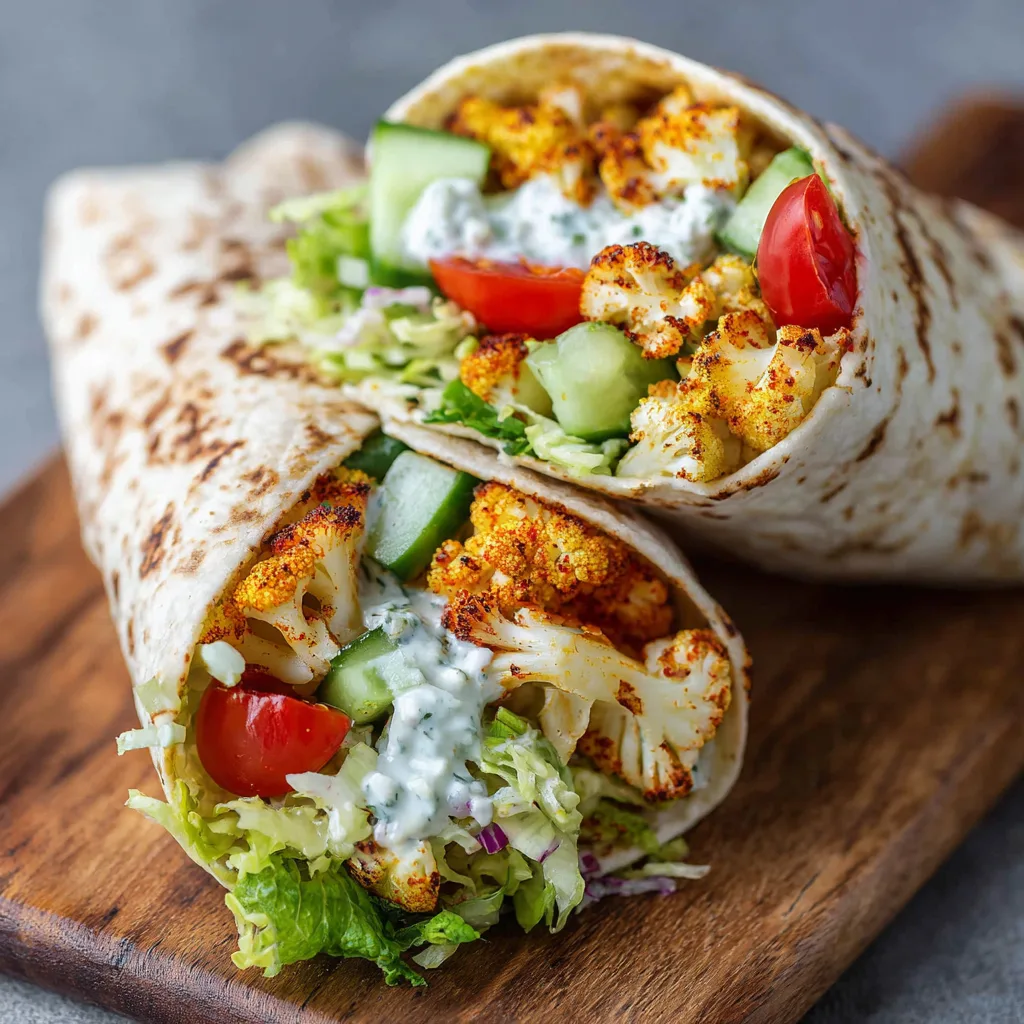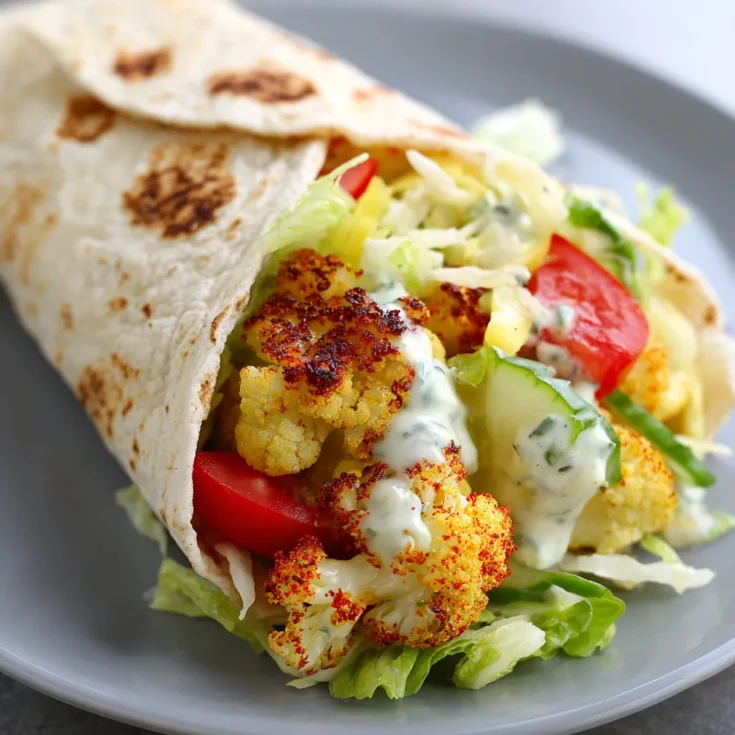Introduction to Healthy Low Carb Cauliflower Wraps
What Are Cauliflower Wraps?
Cauliflower wraps are an innovative alternative to traditional wheat or flour-based wraps. Instead of relying on grains, these wraps use cauliflower as the primary ingredient. This substitution significantly lowers carbohydrate content while delivering a satisfying texture that holds fillings well. Typically, cauliflower is processed into fine rice-like pieces, combined with binding agents like eggs or flaxseed, then shaped and cooked into thin, pliable wraps. These wraps mimic the function of traditional tortillas but offer a fresh, vegetable-based twist.
Unlike conventional wraps loaded with refined carbs and gluten, cauliflower wraps appeal to those seeking healthier, gluten-free, or keto-friendly options. They provide a great way to enjoy favorite dishes such as burritos, sandwiches, or roll-ups without the guilt of excess carbs. Cauliflower wraps also tend to be lighter and easier to digest, making them a favorite among health-conscious consumers and those managing dietary restrictions.
Why Choose Low Carb Cauliflower Wraps?
Choosing low carb cauliflower wraps aligns well with modern health trends emphasizing reduced carbohydrate intake. Cutting back on carbs helps regulate blood sugar levels, supports weight management, and improves overall metabolic health. Cauliflower, as a cruciferous vegetable, naturally fits into low-carb and ketogenic diets due to its minimal carbohydrate content.
Moreover, cauliflower is rich in fiber and essential nutrients, enhancing the nutritional value of your meal. By swapping traditional wraps for cauliflower-based ones, you reduce calories while boosting your intake of vitamins like C and K. This combination makes cauliflower wraps not just a low-carb choice but also a nutrient-dense option that promotes satiety and supports digestion. In essence, these wraps offer a delicious and healthful way to enjoy meals while meeting dietary goals.
Nutritional Benefits of Cauliflower Wraps
Nutritional Profile of Cauliflower
Low in Calories and Carbohydrates
Cauliflower stands out as a low-calorie vegetable, containing roughly 25 calories per cup. It also boasts a very low carbohydrate count—about 5 grams per cup, with 2 grams coming from fiber. This makes it an ideal ingredient for wraps aimed at reducing carb intake. When transformed into wraps, cauliflower significantly lowers the calorie and carb content compared to traditional grain-based options. This benefit supports diets focused on blood sugar control, weight management, and metabolic health without sacrificing taste or texture.
Rich in Fiber and Antioxidants
Fiber plays a crucial role in maintaining digestive health, and cauliflower delivers around 2 grams of fiber per cup. This fiber aids in regular bowel movements and promotes a healthy gut environment. Beyond fiber, cauliflower contains powerful antioxidants like sulforaphane. These compounds help neutralize harmful free radicals in the body, reducing inflammation and protecting cells from damage. The presence of antioxidants in cauliflower adds another layer of health benefits to these wraps, making them a nutrient-rich choice.
High in Essential Nutrients
Cauliflower packs an impressive variety of vitamins and minerals. It provides high levels of vitamin C, which supports immune function and skin health. Vitamin K, abundant in cauliflower, plays a key role in blood clotting and bone strength. Additionally, cauliflower offers B vitamins, folate, potassium, and magnesium—all essential for energy production, cardiovascular health, and muscle function. Incorporating cauliflower wraps into your meals ensures you benefit from these nutrients in a delicious, easy-to-eat format.
Health Benefits of Incorporating Cauliflower Wraps
Supports Digestive Health
The fiber content in cauliflower wraps promotes efficient digestion by increasing stool bulk and supporting beneficial gut bacteria. A healthy gut microbiome contributes to overall well-being and can reduce digestive discomfort. Regular consumption of fiber-rich foods like cauliflower supports sustained digestive health, making these wraps an excellent choice for anyone looking to improve gut function.
Aids in Weight Management
Cauliflower wraps help with weight management by delivering low calories while increasing feelings of fullness. The fiber slows digestion, keeping hunger at bay longer. Replacing high-carb, calorie-dense wraps with cauliflower options helps reduce overall calorie intake without compromising on meal satisfaction. This makes cauliflower wraps a smart addition to weight loss or maintenance plans.
Antioxidant Properties
Cauliflower’s antioxidants help protect the body from oxidative stress—a factor linked to chronic diseases including cancer. Sulforaphane, in particular, has been studied for its potential to inhibit the growth of cancer cells. By including cauliflower wraps in your diet, you boost your intake of protective compounds that may contribute to long-term health and disease prevention.
How to Make Healthy Low Carb Cauliflower Wraps
Ingredients Required
Creating delicious cauliflower wraps starts with simple, wholesome ingredients. Here’s what you’ll need:
-
1 medium head of cauliflower, riced
-
2 large eggs to bind the mixture
-
1/4 cup ground flaxseed or almond flour for structure
-
1/2 teaspoon garlic powder for flavor
-
Salt and pepper to taste
-
Optional: herbs like parsley or oregano for extra zest
These ingredients come together to form a dough-like base that transforms into flexible, tasty wraps. You can adjust spices and binding agents based on dietary preferences or texture goals.
Step-by-Step Preparation Guide
Preparing the Cauliflower
Start by ricing the cauliflower. Use a food processor to pulse cauliflower florets until they resemble fine grains. If you don’t have a processor, finely chop by hand.
Next, cook the riced cauliflower to remove excess moisture. Steaming for about 5 minutes or microwaving in a covered dish for 4 minutes works well. Avoid overcooking to preserve texture.
Once cooked, let the cauliflower cool briefly. Then, use a clean kitchen towel or cheesecloth to squeeze out as much moisture as possible. Removing water is key to preventing soggy wraps.
Making the Dough
Transfer the dried cauliflower to a mixing bowl. Add eggs, ground flaxseed, garlic powder, salt, and pepper. Mix thoroughly until a sticky dough forms. The binding agents hold the wraps together during cooking.
If the mixture feels too wet, add a bit more flaxseed or almond flour. If too dry, a splash of water or an extra egg can help. The goal is a pliable dough that holds shape but isn’t crumbly.
Shaping and Cooking the Wraps
Divide the dough into six equal portions. Place one portion between two sheets of parchment paper. Roll out into a thin, round shape, about 6 to 8 inches in diameter.
Carefully peel off the top parchment. Transfer the wrap on the bottom parchment to a baking sheet.
Bake at 375°F (190°C) for 10 to 12 minutes, flipping halfway. You can also pan-fry the wraps in a non-stick skillet over medium heat for about 3 minutes each side until golden and firm.
Allow wraps to cool slightly before filling or stacking. This helps them firm up and prevents tearing.
Tips for Perfect Cauliflower Wraps
-
Get the moisture out: Squeeze cauliflower thoroughly to avoid sogginess.
-
Consistent thickness: Roll wraps evenly for uniform cooking.
-
Don’t overcook: Overbaking makes wraps brittle and prone to breaking.
-
Store properly: Keep wraps in an airtight container in the fridge for up to three days.
-
Reheat carefully: Warm wraps on a skillet or in the oven; avoid microwaving to preserve texture.
Following these steps ensures your cauliflower wraps stay flexible, tasty, and ready for any filling you choose. Experiment with herbs and spices to personalize your wraps and make them your own healthy staple.
Creative Ways to Use Cauliflower Wraps
Versatility in Meal Planning
Cauliflower wraps offer impressive versatility, making them a perfect addition to any meal plan. Their neutral flavor and flexible texture allow you to experiment across all meal types, from hearty breakfasts to light snacks.
Breakfast Ideas with Cauliflower Wraps
Start your day with a nutritious boost by filling cauliflower wraps with eggs and fresh vegetables. Scrambled eggs paired with sautéed spinach, mushrooms, or bell peppers create a satisfying and low-carb breakfast wrap. You can also add cheese or avocado for extra creaminess and flavor. These wraps provide a quick, portable option that keeps you energized without heavy carbs.
Lunch Options Using Cauliflower Wraps
For lunch, load your wraps with lean proteins like grilled chicken, turkey, or tofu alongside crisp leafy greens and crunchy veggies. Adding a drizzle of a light vinaigrette or a low-carb dressing enhances taste without adding unwanted carbs. Cauliflower wraps hold up well to fresh salad fillings, making them an excellent choice for a healthy midday meal.
Dinner Recipes Featuring Cauliflower Wraps
At dinner, cauliflower wraps can replace traditional bread or tortillas in dishes like fajitas, stir-fries, or grilled veggie wraps. Fill them with roasted meats, sautéed vegetables, and a sprinkle of cheese or herbs to create a low-carb, satisfying plate. These wraps blend well with bold seasonings and hearty fillings, supporting your low-carb lifestyle without sacrificing flavor.
Snack and Appetizer Ideas
Cauliflower wraps also work beautifully as light snacks or appetizers. Cut baked wraps into smaller pieces and serve with a variety of low-carb dips like guacamole, salsa, or creamy herb spreads. Roll wraps around sliced veggies or deli meats for bite-sized snacks that are both filling and flavorful. Their crispness when toasted adds enjoyable texture to party platters or quick bites.
Pairing Cauliflower Wraps with Dips and Sauces
Complement your wraps with an array of low-carb dips and sauces to elevate every bite. Options like garlic aioli, tzatziki made with Greek yogurt, or spicy chipotle mayo enhance flavor while keeping carbs low. Fresh salsa, guacamole, and creamy avocado-based dressings also pair perfectly with the mild taste of cauliflower wraps. Experimenting with these accompaniments keeps meals exciting and delicious.





